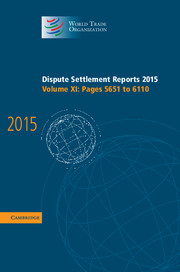Book contents
- Frontmatter
- Contents
- United States - Measures Concerning the Importation, Marketing and Sale of Tuna and Tuna Products - Recourse to Article 21.5 of the DSU by Mexico (WT/DS381): Report of the Panel - Annexes
- United States - Countervailing Duty Measures on Certain Products from China - Arbitration under Article 21.3(c) of the DSU (WT/DS437/16): Award of the Arbitrator
- United States - Anti-Dumping Measures on Certain Shrimp from Viet Nam - Arbitration under Article 21.3(c) of the DSU (WT/DS429/12): Award of the Arbitrator
- Peru - Additional Duty on Imports of Certain Agricultural Products - Arbitration under Article 21.3(c) of the DSU (WT/DS457/15): Award of the Arbitrator
- United States - Certain Country of Origin Labelling (COOL) Requirements - Recourse to Article 22.6 of the DSU (WT/DS384, WT/DS386) Decisions by the Arbitrator
- Cumulative List of Published Disputes
United States - Certain Country of Origin Labelling (COOL) Requirements - Recourse to Article 22.6 of the DSU (WT/DS384, WT/DS386) Decisions by the Arbitrator
Published online by Cambridge University Press: 28 September 2017
- Frontmatter
- Contents
- United States - Measures Concerning the Importation, Marketing and Sale of Tuna and Tuna Products - Recourse to Article 21.5 of the DSU by Mexico (WT/DS381): Report of the Panel - Annexes
- United States - Countervailing Duty Measures on Certain Products from China - Arbitration under Article 21.3(c) of the DSU (WT/DS437/16): Award of the Arbitrator
- United States - Anti-Dumping Measures on Certain Shrimp from Viet Nam - Arbitration under Article 21.3(c) of the DSU (WT/DS429/12): Award of the Arbitrator
- Peru - Additional Duty on Imports of Certain Agricultural Products - Arbitration under Article 21.3(c) of the DSU (WT/DS457/15): Award of the Arbitrator
- United States - Certain Country of Origin Labelling (COOL) Requirements - Recourse to Article 22.6 of the DSU (WT/DS384, WT/DS386) Decisions by the Arbitrator
- Cumulative List of Published Disputes
Summary
INTRODUCTION
Initial Proceedings
The present arbitration proceedings arise in the disputes initiated by Canada and Mexico concerning the United States’ country of origin labelling (COOL) requirements for meat products.
On 23 July 2012, the DSB adopted the original Appellate Body reports in these disputes, and the reports of the original panel as modified by the Appellate Body. The findings adopted by the DSB were that the COOL measure at issue in the original proceedings (the original COOL measure) was inconsistent with Article 2.1 of the TBT Agreement because it accorded less favourable treatment to imported livestock than to like domestic livestock.
On 4 December 2012, following referral to arbitration under Article 21.3(c) of the DSU, an arbitrator determined that the reasonable period of time for the United States to implement the DSB's recommendations and rulings would expire on 23 May 2013. At the DSB meeting on 24 May 2013, the United States announced that, in order to come into compliance with the DSB's recommendations and rulings, the United States “had issued a final rule that made certain changes to the country-of-origin (COOL) labelling requirements”, and that these actions “brought the United States into compliance” with those recommendations and rulings.
On 19 August 2013, Canada and Mexico requested the establishment of a panel under Article 21.5 of the DSU, to determine whether the “amended COOL measure” brought the United States into compliance. On 29 May 2015, the DSB adopted the Article 21.5 Appellate Body reports in these disputes, and the reports of the compliance panel as modified by the Appellate Body. The findings adopted by the DSB were that the amended COOL measure violated Article 2.1 of the TBT Agreement and Article III:4 of the GATT 1994 because it continued to accord less favourable treatment to imported livestock than to like domestic livestock.
On 4 June 2015, Canada filed a request with the DSB for authorization to suspend concessions or other obligations under Article 22.2 of the DSU. In its request, Canada sought authorization to suspend concessions and related obligations in the goods sector under the GATT 1994 to an annual value of CAD 3.068 billion.
- Type
- Chapter
- Information
- Dispute Settlement Reports 2015 , pp. 5877 - 6082Publisher: Cambridge University PressPrint publication year: 2017



